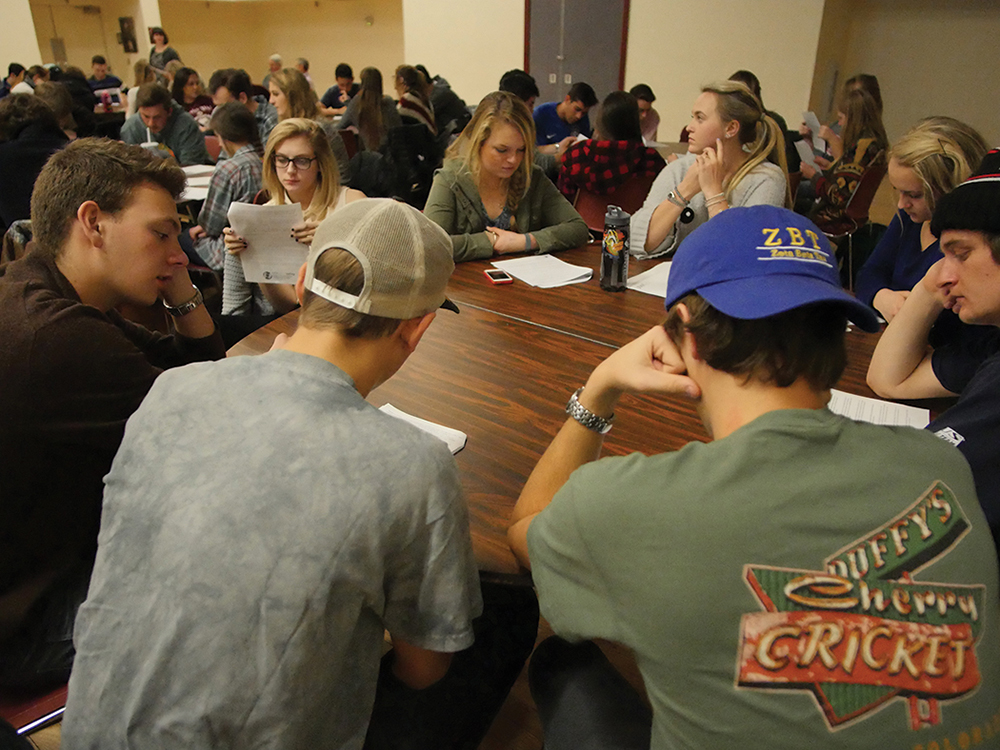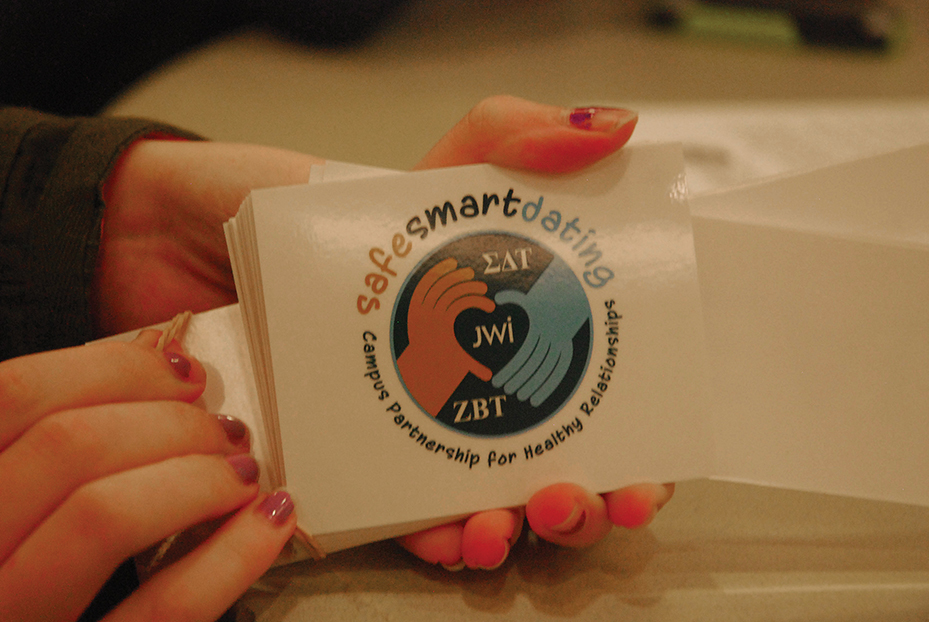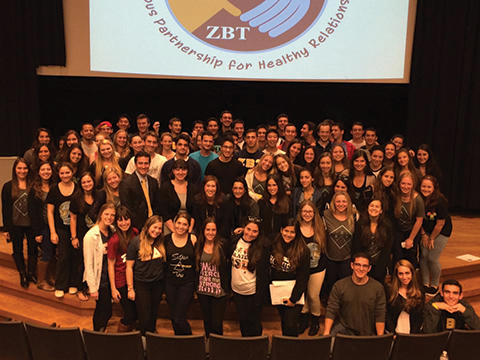Enough is Enough
Fewer and fewer campus rapes are being swept under the rug – or beneath the quad – thanks to brave young women and prevention programs that work.
by Elicia Brown
On the first evening of her sophomore year at the University of Michigan, Sara Cohen (whose name was changed for this story) was out with a group of college friends, whom she’d been so excited to see after a summer away. The group was drinking at a party and although Cohen does not remember the gathering, her friends say a boy was flirting with her. Cohen had a serious boyfriend at the time, who she had been dating for three years and who her friends had all met. Her friends left. She blacked out. When she came to, she was in the bed of a boy she didn’t know, who was insisting that Cohen “take Plan B,” the morning after pill which reduces the chance of pregnancy after unprotected sex. He told her he had used a condom but added, `I don’t like to risk it,’ as if he’d done this a thousand times.”
A new phase of Cohen’s life had begun.
She distanced herself from the circle of friends she’d cultivated her freshman year. She felt isolated on the campus she’d loved so much the year before. She didn’t know who to talk to, where to turn. Her three-year relationship with her boyfriend began to unravel. “Worst of all,” she says in a speech she recently shared with an audience at the campus Hillel, “I blamed myself. I felt ashamed and damaged.”
If it had been a generation ago or even a decade ago, Cohen may very well have eventually and quietly accepted the “date rape” as an unfortunate event of her youth and moved on with her life. Cohen’s assault, however, occurred during a watershed moment in the long history of sexual assault on college campuses. Increasingly, the issue of rape on campuses is not being swept under the rug – or beneath the quad.
Like a growing cohort of young survivors, Cohen is taking action. She’s been working as an ambassador to Michigan, disseminating information on behalf of Jewish Women International about its work in preventing violence against women on college campuses. Finally, she applied for and received a grant to bring a JWI program, “Safe Smart Dating” to her campus. The two-hour workshop focuses on awareness and prevention.
She’s not ashamed to speak publicly about her experience, and is passionate about educating others in language used around sexual assault. Too easily and too often, stories that involve alcohol, like her own, can come off as victim-blaming. As Cohen explains, "Alcohol is an excuse for and a tool to perpetrate violent behavior; it is never a justification for the perpetrator's actions. That is not to say that the experience taught me nothing about binge drinking. On the contrary, because of the horror of that night, I no longer take shots or drink beyond my limits and I have never again blacked out. It is definitely important for young people (both men and women) to learn how to drink responsibly; however, it is more important for young people (both men and women) to learn that violence against one another is not only morally wrong and unacceptable, but punishable by law."
In a sense, Cohen could be considered to be part of a national movement of young activists. These women – and a few men – want to do more than “Take Back the Night” as college women did when they marched through dark campuses in the 1980s and ‘90s in a quest to highlight security flaws, but to also change the whole dynamics of how rape allegations are handled, how survivors are treated, and how preventative education is offered.
“Incredible, brave women have been coming forward in the past five years and putting a compelling face on the problem,” says Sharyn J. Potter, an associate professor of sociology at the University of New Hampshire and co-director of Prevention Innovations, a research center dedicated to implementing programs that will end violence against women. “These are our daughters, our neighbors.”
This wave of activism includes women like Emma Sulkowicz, the Columbia senior who is both Asian and Jewish, and has gained national attention by carrying a mattress throughout her campus on which she says she was raped. It also includes women like Alexandra Brodsky, an early and notable survivor in this scene, who filed a suit against Yale along with 15 others after a rape her freshman year, 2009. Brodsky, who told the Yale Daily News that her early sense of social justice was sparked in her synagogue, founded “Know Your IX” in 2013.
For Cohen, no doubt, these women have helped pave a path forward. But there’s also an organization that she directly credits for her education on the laws surrounding assault, and her journey to healing: JWI.
Pioneering Role
JWI, where Cohen worked as a summer intern in 2014, has one of the most, if not the most, well-developed approaches in the Jewish world to combatting sexual violence on college campuses.
Initiatives range from the two-hour workshop, which Cohen is eager to bring to Michigan, to assault prevention campaigns tailored specifically to the needs of Northwestern University and the University of Chicago, funded by a grant from the Chicago Jewish Women’s Foundation. There’s also an awareness campaign in use by campuses across the country. In addition, in an effort to recruit and inform men, in March 2015, JWI held a rally day on Capitol Hill – "Brother to Brother" – that gathered 150 high school boys from the BBYO youth movement and young adult leaders from the fraternity ZBT.
For JWI, even if the arena is a new one, the battle is not. The organization has been working on reducing domestic violence in the Jewish community since the late 1990s, so “it’s natural that we began to look at the issue of sexual violence on college campuses as part of a continuum,” says Lori Weinstein, JWI's CEO.
The workshop, “Safe Smart Dating,” was piloted at three schools in the fall of 2013, and has since reached more than 25 campuses by spring 2016. The program, created in partnership with SDT sorority and ZBT fraternity, features a lecture presentation, videos of survivors, and facilitated table conversations. Participants praise its focus on Greek life, which has been the scene of many reported rapes.
It is making a considerable difference. A texting poll at the program’s start, for example, indicates the number of survivors in every room. “It’s happening more than you think,” said Lindsay Baker, a senior at Emory University in Atlanta.
Among the key tools used in JWI’s workshop: 1) engaging men as allies, 2) peer to peer education, and 3) educating college students on the meaning of consent to sex.
Male Advocates
Stephen Stanis, a recent graduate of University of Denver, can’t imagine a one-sided conversation about sexual violence. After all, he says, “It takes two to tango.” Also, “It shouldn’t be a fight that women do alone.”
Stanis, who was a vice president of ZBT, recently participated in JWI’s workshop, which is coed by design. He says a lot of women who attended the workshop told him they were impressed that the guys seemed to understand the gravity and complexity of the issues. As Stanis says, “Both halves need to be in on the conversation.”
At 16, Jules Jacobs may have been one of the youngest men to join the mission. As a sophomore at Wootton High School in Rockville, Md., Jacobs was the one who first suggested that BBYO lobby with JWI. “We need to know how to be responsible men in a college setting,” said Jules, who is founder and president of his chapter, Sammy Davis, Jr. AZA in the D.C. Council.
Already, Jules understood the proper protocol of bystanders. If he’s at a party and spots a guy flirting aggressively with a girl who has consumed alcohol, he’ll approach the girl and say, “Hey, let’s get you home.”
Jules Jacobs
Bold Bystanders
Jules has implicitly adopted the code of bystander intervention, or acting as “the upstander,” in the jargon of Laurel Ruza, a senior at University of Michigan, who interned at JWI’s office in the summer of 2012. “It’s a role that friends have taken on for me,” Ruza explains.
For example, “If there’s a guy talking to me at the bar, my friends will be mouthing 'Are you O.K.?’ Or they might say, 'Oh Laurel, will you go the bathroom with me?’” A more assertive friend might inform the guy: “`Hey, you need to back off. That’s not cool.’”
The Safe Smart Dating workshop teaches this role. A participant in the workshop, who requested anonymity, says she recently spotted a friend in trouble at a frat party. The friend was dancing with a guy who was drinking, and was also “pushing the friend against the wall.” The young woman sprang into action, blockading the guy with her body, suggesting to her friend it was time to leave.
Yes Means Yes!
Perhaps one of the more complex issues regarding intimacy among college students relates to consent.
“People don’t talk about consent in sex ed. Why isn’t that day one? It doesn’t surprise me that college students don’t know how to navigate this space,” says Dana Fleitman, the JWI program manager who designed the Safe Smart Dating workshop.
Today’s activists reject the old catch phrase, “No means no.” Today, “yes means yes,” and Fleitman adds another level: Yes should mean “an enthusiastic yes.”
Fleitman tells college audiences in the workshop, “If someone’s body is tensing, if someone is not kissing you back, if someone is putting clothes back on, if someone is drunk and incapacitated, that’s not what enthusiasm looks like.”
“Everyone agreed [that sobriety] should be a standard but it’s very hard to do. Alcohol is just everywhere in college,” says Allie Levin, a junior at University of Maryland, who served as a group leader in the Safe Smart Dating workshop on her campus.
“If someone drinks, the punishment should be a hangover, not sexual assault,”says Fleitman. One of the strengths of the workshop, she believes, is that it provides a safe space for meaningful conversations on the real complexities of consent and alcohol.
Cultural Shift
Nuances over consent notwithstanding, the conversation has started in earnest. These days it’s hard to miss the uproar over rape culture on college campuses. The clamor last December, which focused on the questionable journalistic practices used in Rolling Stone magazine’s article on a gang rape at University of Virginia, marked only the most recent in a series of high profile events; and in the words of Weinstein, “the train is moving too fast to be permanently derailed by something like that.”
Americans have been rattled by the shocking and oft-cited statistic – as many as one in five women will be a victim of sexual violence during her college years. This statistic, most recently confirmed by the AAU Campus Survey on Sexual Assault and Sexual Misconduct, was conducted for the Justice Department’s National Institute of Justice, and based on data collected from two large universities. In January of 2014, President Barack Obama publicized the statistic further when he announced a task force to protect students from sexual assault. Since then, more than 200 colleges have been under federal investigation for sexual misconduct.
It is in this kind of environment that in 2014, Dana Kukin, a Barnard senior who identified as an Orthodox Jew, found herself standing amid a crowd of students carrying dorm mattresses to symbolize the burden of sexual assaults. Spontaneously, Kukin announced that she too is a survivor of rape. She’d shared her story before but in a more intimate setting. Now, though, rape “is one of the most talked about topics on campus,” she says. “I think some of the girls who organized the rally were surprised by how many people shared their stories and opinions.”
“It’s an exciting time to be involved,” says John Foubert, a professor at Oklahoma State University, who has studied sexual assault for more than 20 years. For years, he says, “we were out there in the wilderness screaming at the sand. Now people are definitely listening.”
Some complain of a backlash. Still, there’s no doubt that a bright spotlight finally shines upon the decades-old issue of sexual violence on college campuses, where the potent mix of alcohol and a hookup culture can brew up disastrous consequences. We don’t yet know the outcome of these conversations, investigations and legislation. We do know though that JWI's work is playing a part in the solution. As Weinstein says, “This can only be fixed by transforming the culture, by changing the culture of every man, woman, campus officer and athlete.”
Sara Cohen understands about transformation. What she learned during her internship at JWI about the laws regarding rape on campus and the importance of activism as well as the Jewish values of kindness and community empowered her and were “ultimately the antidote to my suffering,” she told the audience at Michigan Hillel. She was able to finally heal.
(Originally published in spring 2015.)
Elicia Brown is a freelance writer who lives in Manhattan.





